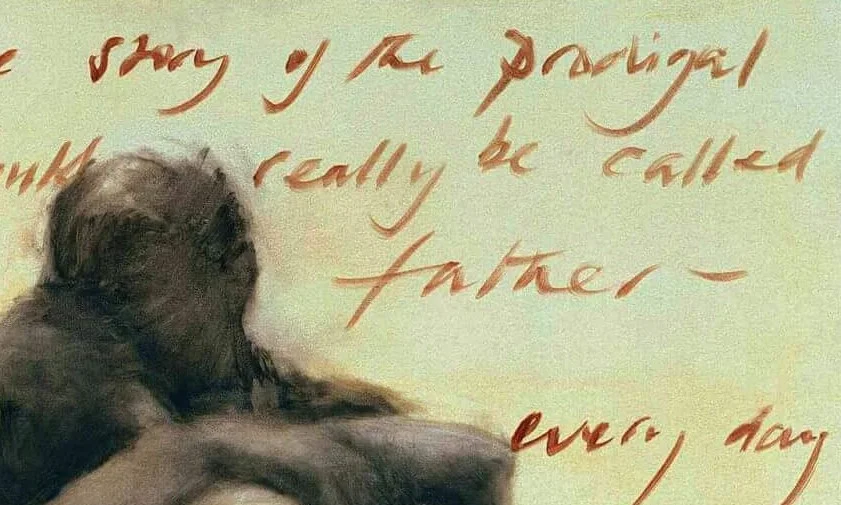Home
Home: April 15, 2019
In 2007, the year after both my mother and my Aunt Nancy had died, my sweet Aunt Jo took my cousins and me to London for a week. Her daughter, my cousin, Nancy, was there in graduate school. It was a wonderful week! On Sunday, we went to Holy Trinity Church in Brompton. Hanging in the landing of a stairwell was a large, square painting by Charlie Macksey called The Return of the Prodigal Son. It’s a beautiful, spare painting depicting two figures embracing, and as you mount the stairs you begin to make sense of what you are seeing.
It stopped me in my tracks. I moved to the side so that I could stand and stare at it. I was so moved that later that day I bought a postcard of the painting and carried it for years in my journal.
The painting is breathtaking, but what is so arresting is the writing. Scrawled across the canvas, phrases broken by the embracing figures, is this:
“This is the story of the Prodigal Son. It should really be called the running father—who waited every day for his boy to return. The boy who had rejected him so badly, and finally, when he saw him from a long way off—his father ran to him and hugged him and kissed him. Luke 15x. ”
It brings tears to my eyes to type it, all these years later. And I’ve never been able to hear the gospel lesson without tearing up, too.
Which is what happened when our pastor read it a couple of Sundays ago. His excellent sermon, Grace Will Lead Me Home, explored the same idea of renaming this story according to the viewpoint of the various characters. And even though I’m the third child, the only girl with two older brothers, I have at times been the Responsible but Unforgiving Older Child:
“Are we like the Older Brother? Are we like the prophet Jonah, who was so angry at the Ninevites for the atrocities they regularly committed and so angry at God for being willing to forgive them that Jonah would rather die before being involved in that reconciliation? But if that’s the case, if we are The Responsible but Unforgiving Older Child standing outside and missing the joy of the party then who is it who needs to be reconciled? Who is it who is lost?”
Standing outside. Resenting the party.
Who is it who is lost? Who is it who is home?
I asked my family what they thought ‘home’ meant.
Mark and I considered that great line of Robert Frost’s in The Death of the Hired Man, “Home is the place where, when you have to go there, they have to take you in.” And whereas I used to like that; I don’t really believe it anymore. There are just too many examples of homes and families broken beyond repair. And if you try to make it a parable, then that would be called the parable of the stingy father, instead of the running one. We eventually settled as the place where you are accepted, where you feel most safe.
Jack said, “I guess it’s people. Family. And Grady. But I think I like the Montreat home best.”
Home means a sense of comfort and familiarity. It has to do with stuff—knowing the stories of the objects, that are placed just there because that’s where I want them. It’s where my books and mugs and trinkets are. And sometimes those things can feel like a bit of portable home, which is why I felt it so keenly when I lost that purple journal which held the Return of the Prodigal postcard. It went missing after Christmas 2017. The journal had a second Charlie Mackey postcard; quotations I wanted to remember; notes from conferences and workshops; prayers; ideas for blogs; and lots of lists. To-do lists with satisfying check marks, lists of books I’d read each year and lists of books I hadn’t (yet), Christmas lists—gifts given and received. I’ve not allowed myself to get attached to another journal. Losing home feels so vulnerable.
I think this is why so many people are eager to get home after a stint in the hospital. And why people want to come home to die. Home is the place where you were able to be yourself—self-sufficient, normal, even generous. The place where you can be a host instead of always a guest, or worse, a patient.
This is part of the stigma of homelessness. And yet, some monastic communities insist that disciples be wandering beggars, for the very reason of impressing the lesson that we are not, in ourselves, self-sufficient. That, at best, we rely completely on God. Being a wandering beggar lets that hit home, you might say.
Are you at home in your faith community?
I was born into a Presbyterian family and went to Episcopal schools but became intrigued with Quakerism my Senior year of college. When I graduated and moved to Columbia, SC, I tried to find a Quaker Meeting—much harder to do in pre-internet days—and eventually I did. Maybe it wasn’t during the first Meeting for Worship, but it was very soon that I had the thought, “This feels like home. There’s a language for who I am! This is what I’ve always been but didn’t know how to say it.”
I’ve learned how to speak my interior language in a way that feels authentic in other church settings. But I wouldn’t have discovered it, I don’t think, without my journey with Quakers. Silence often feels like home.
What is home? Emma said, “Having you. And family. And it’s where it feels safe. And you sleep in your own bed and have your lovies to keep you safe. And God makes it safe. And everywhere is home when I remember God.” Hard to top a six-year old’s answer.
One of my mother’s favorite hymns, was Isaac Watts’ My Shepherd Will Supply My Need, based on Psalm 23. Even before we sang it at her funeral I would get choked up at this last verse. And now that I have children, I don’t even try to sing it, though I, too, love it.
“Your sure provisions gracious God attend me all my days;
Oh, may your house be my abode, and all my work be praise.
Here would I find a settled rest, while others go and come;
No more a stranger, nor a guest, but like a child at home.”
On Friday Emma rode her bike without training wheels for the first time. Mark and I were going to a concert and taking her to the park was not my pre-concert plan, but it was thrilling! Jack gave Emma a lot of good advice and encouragement. She fell again and again and again and then we practiced braking. Finally, I held the handle bar and the back of the seat and ran alongside, then gave a push and watched as she wobbled away chanting, “pedal, pedal, pedal….” before falling a little further away each time. Each time I would yell, “Good job, Emma!!! I’m coming!” And soon Jack was yelling it each time, too.
Home is a place. The place you feel accepted. The place where you entertain yourself and others. The place where your treasures are—be they people or pets or journals. The place where you love to love God.
Home is also the ones who keep you safe. God and your lovies. The running mother. The encouraging brother. The welcoming father. The person who, when you fall, yells, “I’m coming!”
Yesterday, it was my mother-in-law, who called to tell me that she’d found a purple journal she was pretty sure is mine.



